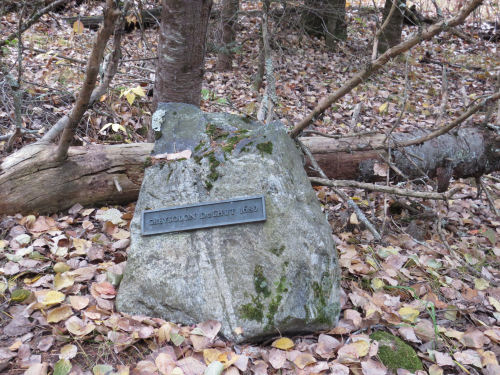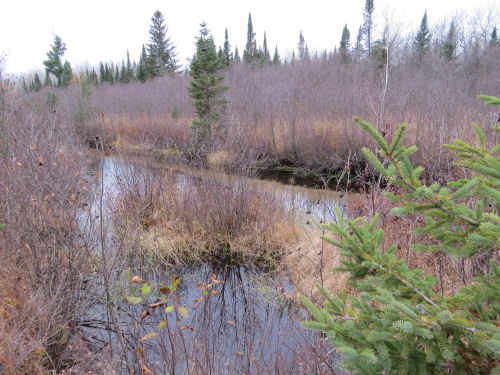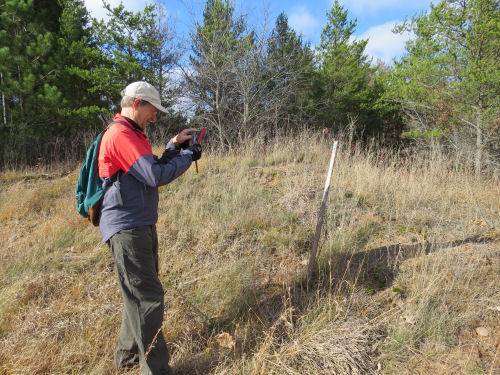When the last glacier retreated and the land rebounded, a ridge arose across a river in this valley that had previously drained Glacial Lake Duluth to the southwest. Bogs formed beside the ridge in the valley of the former river. Remember yesterday's Brule Bog Boardwalk? That area. From the bog, water now flows both south and north in the former valley. The river that heads south is the St. Croix River which ends up in the Mississippi. The river that flows north is the Bois Brule, which now goes into Lake Superior instead of out of Glacial Lake Duluth.
But, are you picturing this? These two rivers, now in different watersheds, are quite close together. You know what happens in places like this when humans show up on the scene and want to travel to different places. It's a portage. Just about three miles separate navigible waters of these two rivers.
Native Americans used this pathway for centuries. The earliest record of a European explorer using it is in 1680, by Greysolon duLhut (for whom Duluth is named). After that it was used by many travelers for many purposes.
Fast forward to 1933. The Daughters of the American Revolution decided to commemorate this historic portage with the names of some famous users. Here is the rock with the name Greysolon duLhut.
I wont show you the other rocks, but here are the names: Greysolon duLhut 1680, Pierre LeSueur 1693, Jonathan Carver 1768, Michel Curot 1805, Jean Baptiste Cadotte 1819, Henry R. Schoolcraft 1820, and George R. Stuntz 1853. You might say that not all of these are famous. Indeed, I had trouble finding information about some of these people. However, I wrote a bit about each of them in North Country Quest.
So, on the North Country Trail, you climb from Upper St. Croix Lake along this portage route, now passing by each stone. Then you descend to this place on the Bois Brule River where you could put in your kayak and float north.
It's very cool that the NCT follows this portage, but that's not all of the story.
In the 1950s, vandals pushed all seven rocks off the edge of the bluff where they tumbled to the bog and were buried by each year's accumulating leaves and debris.
Enter the routing of the North Country Trail, and a man named Chuck Zosel. He made it his personal quest to clear the portage to be part of the trail and to find the commemorative stones. He eventually found every single one! They are now restored to the pathway.
Here is my favorite scenery picture of the day in Mott's Ravine, a Wisconsin State Natural Area.
What could make the day even better? Long-time volunteer, Peter Nordgren, drove an hour each way to hike five miles with me! Here he is taking a picture of a post that needs replacing. Once you have an eye for things that need fixing, you can't stop. Oh yeah, and Peter brought us huge fruit turnovers!
And here we are together at an NCT sign.
Is this enough? No! We also passed what is known as the Gaylord Nelson Portal. He was a Wisconsin Governor, and then a US Senator from Wisconsin. He wrote the National Trails Act, and he also was the founder of Earth Day.
I have some pressing "real life" issues I may have to attend to tomorrow. I have wanted to keep hiking without a break because the weather is good, but I'll see where things stand in the morning. I am due for a break... my body could use it, but it will be a busy day even if no hiking is involved. I just hate to forfeit a decent day to hike.
Miles today: 14.8. Total miles so far: 3838.1.
 | See Pine Barrens Savanna |







3 comments:
Gotta love a friend who brings you a big fruit turnover :)
Lulu: "Vandals! Always ... uh ... vandalizing things."
Java Bean: "¡De ahí el nombre!"
Ann- yuppers!
Lulu & Java- maybe you could bring your sniffers. I hear there is one more still missing.
Post a Comment